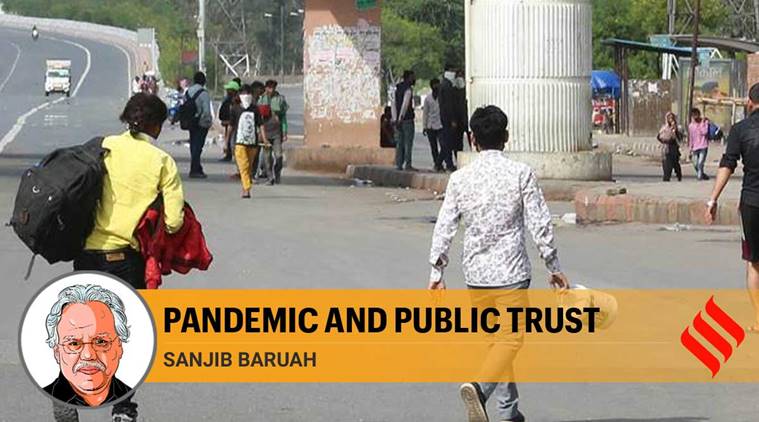 To be sure, democracy or authoritarianism per se has not been the determining factor in the ability to respond effectively to this crisis, writes Sanjib Baruah.
To be sure, democracy or authoritarianism per se has not been the determining factor in the ability to respond effectively to this crisis, writes Sanjib Baruah.
South Korea once featured prominently in what is now, thankfully, an obsolete debate on whether authoritarian governments can deliver better economic growth than democracies. The country was then held as an exemplary success story of export-led development under authoritarian rule. Whatever the wisdom of development experts, and of the “Asian values” ideologues at that time about a supposed trade-off between economic growth and liberty, the average South Korean citizen had a different view. A nation-wide democracy movement ended authoritarian rule in 1987 and inaugurated its current polity: The Sixth Republic.
Three decades later, a government made up of the generation that grew up protesting the US-backed military-authoritarian rule stands as an inspiring example of a liberal democracy successfully controlling a COVID-19 outbreak without ever imposing a lockdown. South Korea was one the world’s worst-affected countries in February. On April 29, it recorded zero domestically-transmitted new cases; its four new cases were all tied to overseas travel.
This is an especially hopeful and instructive story when illiberal leaders of certain democracies are trying to exploit the pandemic to entrench themselves in power and stifle criticism of official high-handedness.
To be sure, democracy or authoritarianism per se has not been the determining factor in the ability to respond effectively to this crisis. One important variable has been the competence of those making key decisions and the public’s trust and confidence in them. The available legal regime shaping governmental responses has made a difference.
A number of democracies, notably the United States, have performed poorly. Yet, it is surely not accidental that New Zealand, Iceland, and Norway, whose leaders — all of them women — have won particular acclaim for their responses, are among the best performing democracies in the world.
There has been much well-deserved praise for the technicalities of the South Korean response: Extensive testing and rapid contact-tracing, the smart use of digital surveillance, and targeted mandatory quarantine only for those sick with COVID-19 or testing positive. But the basic democratic values widely shared among the current government and its supporters that undergird this strategy has not received the attention it deserves.
South Korea’s state-of-the-art Infectious Disease Control and Prevention Act deserves particular attention. It enables the mobilisation of multiple state and non-state actors in a whole-of-society effort to stop the spread of infectious disease. As Brian J Kim points out, it empowers governmental authorities to act far more aggressively during a public health crisis than in many other democracies. They are able to collect private data of confirmed and probable patients, and to require telecommunications companies and police departments to share the geolocation information of those individuals. But the government has been using these powers primarily to foster public trust in its strategy.
In an unusual twist to the idea of the public’s “right to know,” the law requires authorities to disclose locational information on quarantined persons to the public, though, those under medical surveillance have to be eventually notified and the records destroyed. It also sets forth the obligations of the state to disinfect subways, buses and other public places and establishes the right of all citizens to receive free diagnostic and medical treatment for infectious diseases.
This law stands in remarkable contrast to India’s antiquated Epidemic Diseases Act of 1897, invoked to give state governments the authority to enforce containment measures. Originally enacted during the plague panic of Bombay, it allowed the colonial authorities to put infected areas under a de facto state of emergency. The more recent Disaster Management Act of 2005, that Prime Minister Narendra Modi invoked to impose a nation-wide lockdown, was designed with national disasters and not a public health crisis in mind. Unfortunately, it too prioritises military-style command and control measures — not exactly conducive to nurturing public trust.
President Moon Jae-in’s left-leaning Democratic Party won a landslide victory in South Korea’s parliamentary elections last month, signalling strong public approval of the government’s handling of the crisis. Its reliance primarily on the willing and self-motivated cooperation of the public, and not on the coercive powers of the state, has a lot to do with the recent political history of South Korea.
President Moon, a former lawyer specialising in human rights and labour law, came of age during a wave of student protests against authoritarian rule. He was expelled from school and jailed for his role in those protests. Moon and other one-time pro-democracy student protesters are now members and supporters of the current government.
“Whenever democracy has fallen into a crisis,” Moon told a reporter after being elected to office in 2017, “the Korean people have sprung up in rage.”
Having been on the receiving end of authoritarian arbitrariness, the current generation of South Korean leaders appreciate the need to transcend what the University of Chicago-educated vice-health minister Kim Gang-lip describes as the “limitations of the conventional approach to fighting infectious disease.” Gaining the public trust through transparency and quick information flow, he says, is central to his government’s strategy.
It is far too early in the coronavirus saga to pronounce this or any other strategy successful. Yet, what this newly-energised and vibrant democracy has been able to achieve in the past few months holds important lessons for the rest of us — especially for the once lively, but now exhausted democracies of the world.
Baruah is professor of political studies at Bard College, New York, and author of the 2020 published, In the Name of the Nation: India and its Northeast
This article first appeared in print under the the headline Pandemic and public trust